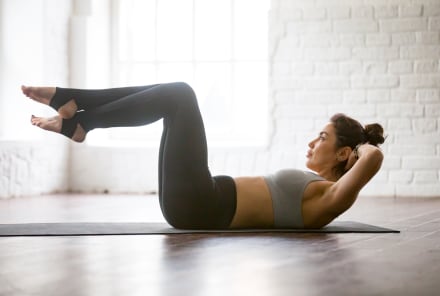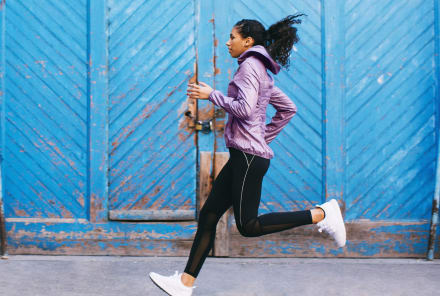Advertisement
A Runner's Guide To Hip Pain: Symptoms, Causes & Treatment


You're gliding toward the final mile of that epic run when you start to notice an annoying pain in your hip. What gives?
You may have experienced general tightness or discomfort in your hips after sitting in the same place for too long. But hip pain from running is different and may require more specific measures for treatment and recovery. Whether you're a new runner or a seasoned one, hip pain is common. Here's what you should know about recognizing and managing it, according to experts.
What are hip pain symptoms?
Common areas you may experience hip pain include the front of the hip, the sit bones (where your bottom hits the seat), or on the outside of the hip where the iliotibial (IT) band runs, says physical therapist Meghan Cass, P.T., DPT.
The symptoms can vary depending on the tissue or structure involved, Sarah Kostyukovsky, PT, DPT, OCS, explains. For example, some hip problems may cause sharp pain inside the hip joint, while others can lead to dull, achy pains.
"Even if you're feeling pain in the hip, it might not necessarily be caused by the hip," Cass says. "It might be because your calves or your core aren't quite as strong."
What causes hip pain?
One of the most common causes of hip pain is overuse. This is especially common in runners, Kostyukovsky explains, since it's a repetitive, high-impact movement.
Mechanics (aka how you're running) can play a major role in hip pain, as can external factors like footwear or your running surface, says Cass. If you're wearing shoes that are too old, or not suited for your feet, it could have an impact.
"Some great running surfaces are wood chip trails or groomed grass, as they will absorb more of the load and take strain off of the body," Cass says. "Concrete is the hardest, most dense surface to run on." If you live in a more urban area, she recommends running on asphalt or over concrete sidewalks when safe.
The body itself also plays a significant role in potential hip pain, says Cass. Some things are out of your control, like the height and arch of your feel. "Flat feet or pronation with running can lead to the hip muscles having to work harder to support the body," she explains.
That said, there are a number of factors that are in your control, like your hip strength, flexibility, and balance. Working with a physical therapist in a pre-hab or re-hab setting can help you address these areas.
How can you treat hip pain?
There are several specific injuries that may lead to hip pain (hip strain, stress fractures, tendinitis, etc.), and it can be difficult to identify which one you're suffering from. In order to do so, Cass recommends reaching out to a medical professional—especially if the pain is interfering with daily activities.
If you find it difficult to reach down and pick up your young kids, a basket of laundry, or sleep well, you should probably seek help from a primary care doctor, Cass says. If your pain is minor, however, there are a few ways you could try treating it at home.
For starters, it's important to rest and limit the amount of pressure on your injured hip. If your hips feel tight but not injured, you may benefit from yoga practices or hip opening stretches.
Stretching, strengthening, and building a routine is important for runners, Cass says. "Dynamic stretching is what we recommend before running. That's where you're moving your muscles. It helps promote blood flow and a little bit more elasticity and flexibility to the muscles," she says. Dynamic stretches may include a walking hamstring stretch or a walking lunge.
After running, Cass recommends static stretching. "That's where you're holding a stretch for a long time—it's usually what you picture when you think of stretching."
Working with a personal trainer or physical therapist can also help you figure out the best way to manage your hip pain.
How can you prevent hip pain?
When it comes to preventing hip pain, Cass refers back to the three main causes: overuse, mechanics, and external factors.
"If you have mechanical difficulties, problems with footwear, and a weak core, you have to address all of it," Cass says, "but prioritize what's going to make the most impact."
If overuse is your biggest concern, cross-training in addition to running can reduce the impact. "The biggest way to prevent hip pain is to stay strong throughout the hips, core, and ankles," she says. Some great options include supplemental yoga or Pilates workouts to increase strength in areas where you're noticing deficits. It's also important to rest your body as needed.
If the soles of your shoes are run down and lacking support, it may be time to buy a new pair. Generally, you should swap them out after 300 to 400 miles of wear. Since everyone's feet are different, it's nearly impossible to recommend a "best" running shoe. Instead, Cass suggests finding a small, local running store to find the best shoe for your needs.
Overall, listening to your body by stretching, resting, or cross-training when necessary can help prevent injury.
Is it OK to run if you have hip pain?
"Muscle soreness or a slight strain is OK to run through," Kostyukovsky says. "This type of pain will typically get better with a light jog." If the pain continues for days or weeks and is sharper and more significant, you should stop.
Running coach Elizabeth Corkum primarily recommends rest and medical assistance if your hip pain persists. "Sometimes hip pain could be corrected with the help of a physical therapist."

Short On Time? Try This Personal Trainer's 5-Minute Full-Body Workout
Krista Stryker, NSCA-CPT

Short On Time? Try This Personal Trainer's 5-Minute Full-Body Workout
Krista Stryker, NSCA-CPT

Short On Time? Try This Personal Trainer's 5-Minute Full-Body Workout
Krista Stryker, NSCA-CPT

Short On Time? Try This Personal Trainer's 5-Minute Full-Body Workout
Krista Stryker, NSCA-CPT










